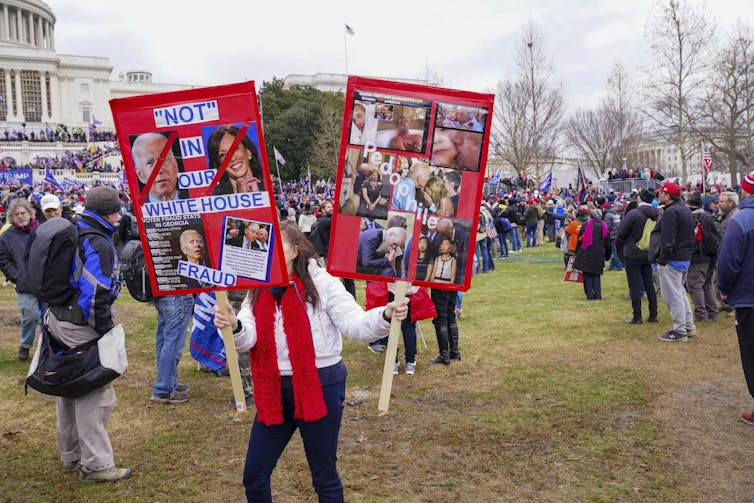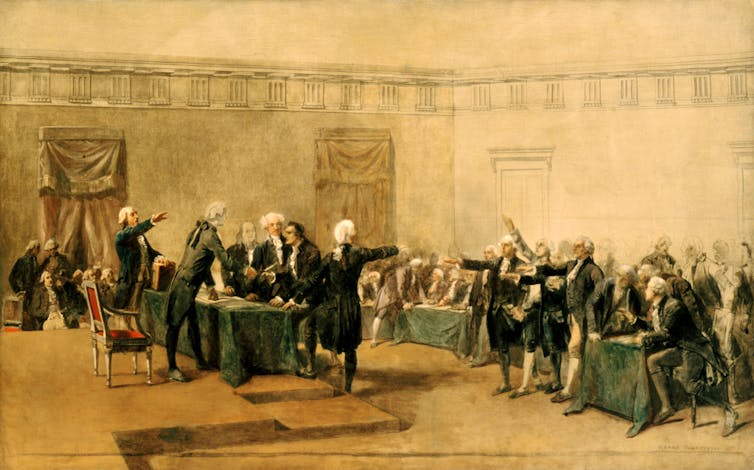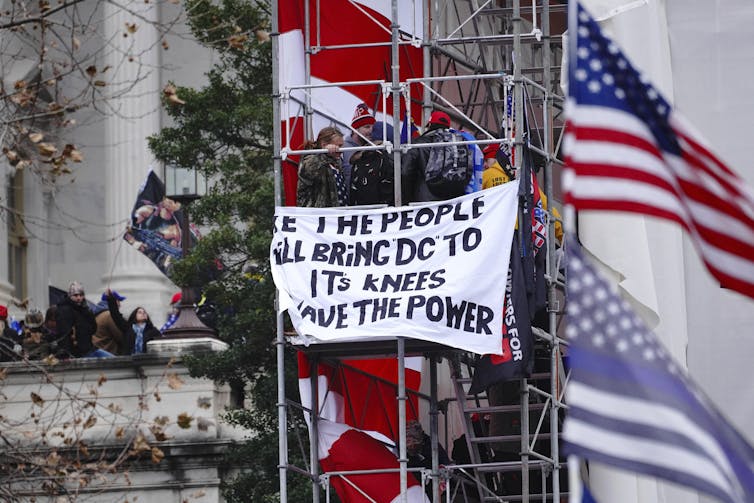Why the alt-right believes another American Revolution is coming
- Written by Clare Corbould, Associate Professor, Contemporary Histories Research Group, Deakin University

The alt-right, QAnon, paramilitary and Donald Trump-supporting mob[1] that stormed the US Capitol on January 6 claimed they were only doing what the so-called “founding fathers[2]” of the US had done in 1776: overthrowing an illegitimate government that no longer represented them.
This was the start of what they called the “second American Revolution[3]”.
This is why the “Don’t Tread on Me” flag[4] was visible in the chaos — a symbol of resistance that dates back to the (first) American Revolution and was resurrected[5] a decade ago by Republican Tea Party activists[6].
It is not hard to understand the appeal of this history to Trump’s followers. The era of the “founding fathers” has always loomed large in the minds of most Americans[7]. And stories about the past are, after all, how individuals, families[8], and communities small and large[9], make sense of themselves.
Yet, it is worth noting these recollections of the past are necessarily selective.
The right to life, liberty — and to abolish government
Alt-right extremists, following conservative politicians, have also drawn succour from the Constitution, particularly when it comes to their “rights”, such as the right to free speech and bear arms.
These and other rights were not actually enumerated in the original Constitution, but rather tacked on in the Bill of Rights[10] — a set of ten amendments passed to appease opponents of the Constitution[11] and get it ratified.
These rights are fused together with the more vague yet “unalienable” rights enunciated in the 1776 Declaration of Independence[12] — chief among them being the right to “life, liberty and the pursuit of happiness”.
Read more: Why were the Capitol rioters so angry? Because they're scared of losing grip on their perverse idea of democracy[13]
Drawing on philosopher John Locke’s ideas[14], the Declaration of Independence proclaims “we the people” come together to form a government to protect these rights.
And crucial to Trump supporters today, it says,
whenever any Form of Government becomes destructive of these ends, it is the Right of the People to alter or to abolish it, and to institute new Government.
This was the sentiment voiced on January 6 when pro-Trump rioters stormed the Capitol. They chanted[15] “This is our America” and “Whose house? Our house!”
Trump himself encouraged this thinking[16] when he told the crowd before they marched to the Capitol, “You’ll never take back our country with weakness.”
The question is: who do Trump and, more broadly speaking, the alt-right think has taken the United States from them?
 Many protesters outside the Capitol carried signs against the government. John Nacion/STAR MAX/IPx/AP
Many protesters outside the Capitol carried signs against the government. John Nacion/STAR MAX/IPx/AP
Rights for only a select few
The answer is evident in how the alt-right imagines the past: their vision of history omits or callously ignores the fact their constitutional rights have come at the cost of the lives and rights of others.
Thomas Jefferson wrote in the Declaration of Independence it was a “self-evident” truth “that all men are created equal.” Generations of enslaved and free Black activists and their allies have worked towards[17] realising this goal[18].
Read more: Why the far-right and white supremecists have embraced the Middle Ages and their symbols[19]
But for the founding fathers, and many of their white supremacist heirs, true “citizens” were exclusively white and male. A few years after penning the declaration, Jefferson denounced Black people as inferior[20]. He owned hundreds of slaves. Even his own children, whom he fathered with Sally Hemings, were born into slavery[21].
Almost all of the founding fathers, in fact, were slaveholders[22] or profited from the slave trade[23]. Neither the Declaration of Independence nor the Constitution freed any of the half million enslaved people in the new United States — one-fifth[24] of the population.
Rather, the Constitution purposefully entrenched[25] the institution of slavery. By protecting the rights of slaveholders to pursue their happiness by holding on to their “property[26]”, it doomed four more generations[27] to enslavement.
 Signing of the Declaration of Independence, by Armand Dumaresq. The White House Historical Association (White House Collection)
Signing of the Declaration of Independence, by Armand Dumaresq. The White House Historical Association (White House Collection)
By the start of the Civil War in 1861, there were 4 million people[28] enslaved in the US.
The Constitution also gave the government the power to raise an army. After the American Revolution, this power was used time and again to wage a long genocidal war[29] against Native Americans across the continent.
When enslaved and free Black people and their white abolitionist allies acted against slavery, slaveholders invoked the Revolution. They claimed they were undertaking God’s will to complete the work begun in 1776 of creating a free nation, and made slave-holding former President George Washington[30] their hero[31].
It took an unprecedented and destructive Civil War to finally put an end to slavery, and another century or so for African Americans to achieve full rights as citizens in the United States. Every step of the way, they were contested[32] and blocked[33] by individuals, groups, states and judges[34] who claimed they were upholding the principles of the Constitution.
Read more: Why is the Confederate flag so offensive?[35]
Rights trump equality
It should be no surprise, then, the alt-right movement is invoking the same “Revolution” today.
After Barack Obama’s presidency, Trump gave a voice[36] to the grievances of his largely white supporters who feared they were being displaced in their own country.
And following the summer of the Black Lives Matter movement and Trump’s baseless claims the 2020 election was stolen, the Capitol Hill insurrectionists firmly believed “they” had lost control of the United States. They were no longer the “we the people” in charge.
 A sign at the Capitol insurrection declaring, ‘We the people will bring DC to its knees’. John Nacion/STAR MAX/IPx/AP
A sign at the Capitol insurrection declaring, ‘We the people will bring DC to its knees’. John Nacion/STAR MAX/IPx/AP
As in the past, they also had the support of prominent politicians beyond Trump. One of their supporters, the newly elected Congresswoman Marjorie Taylor Greene (who is also a QAnon supporter[37]) declared before the January 6 move to block the certification of Joe Biden’s presidential victory, “This is our 1776 moment[38]”.
And Congressman Paul Gosar, a prominent Trump supporter, wrote an op-ed entitled “Are we witnessing a coup d’etat?” in which he advised followers[39] to “be ready to defend the Constitution and the White House”.
It has never been entirely clear when exactly the United States was last great[40] in the minds of Trump supporters wearing their “Make America Great Again” caps. It might be the Ronald Reagan presidency of the 1980s for some, or sometime prior to the civil rights, women’s and gay liberation movements and the US defeat in Vietnam[41].
But there’s no doubt as to when this mythical greatness started. The yearning for the founding era — a time when slaveholders overthrew a government to protect their rights (including the right to hold people as property) — is palpable.
References
- ^ mob (twitter.com)
- ^ founding fathers (www.history.com)
- ^ second American Revolution (www.latimes.com)
- ^ “Don’t Tread on Me” flag (theconversation.com)
- ^ resurrected (www.npr.org)
- ^ Tea Party activists (content.time.com)
- ^ loomed large in the minds of most Americans (www.andyschocket.net)
- ^ individuals, families (cup.columbia.edu)
- ^ communities small and large (www.oxfordreference.com)
- ^ Bill of Rights (www.archives.gov)
- ^ to appease opponents of the Constitution (us.macmillan.com)
- ^ Declaration of Independence (www.archives.gov)
- ^ Why were the Capitol rioters so angry? Because they're scared of losing grip on their perverse idea of democracy (theconversation.com)
- ^ ideas (www.neh.gov)
- ^ chanted (slate.com)
- ^ encouraged this thinking (www.brandeis.edu)
- ^ worked towards (scholarship.law.upenn.edu)
- ^ realising this goal (www.mprnews.org)
- ^ Why the far-right and white supremecists have embraced the Middle Ages and their symbols (theconversation.com)
- ^ Black people as inferior (www.pbs.org)
- ^ were born into slavery (ushistoryscene.com)
- ^ were slaveholders (www.history.com)
- ^ profited from the slave trade (www.forbes.com)
- ^ one-fifth (slaveryandremembrance.org)
- ^ entrenched (www.theatlantic.com)
- ^ property (www.penguin.com.au)
- ^ four more generations (www.smithsonianmag.com)
- ^ 4 million people (www.loc.gov)
- ^ to wage a long genocidal war (yalebooks.yale.edu)
- ^ slave-holding former President George Washington (ericaarmstrongdunbar.com)
- ^ their hero (www.historynet.com)
- ^ contested (www.thirteen.org)
- ^ blocked (americanhistory.si.edu)
- ^ individuals, groups, states and judges (www.professorcarolanderson.org)
- ^ Why is the Confederate flag so offensive? (theconversation.com)
- ^ gave a voice (www.nytimes.com)
- ^ QAnon supporter (www.theguardian.com)
- ^ This is our 1776 moment (fb.watch)
- ^ advised followers (www.nytimes.com)
- ^ was last great (theconversation.com)
- ^ US defeat in Vietnam (www.hup.harvard.edu)
Read more https://theconversation.com/why-the-alt-right-believes-another-american-revolution-is-coming-153093













